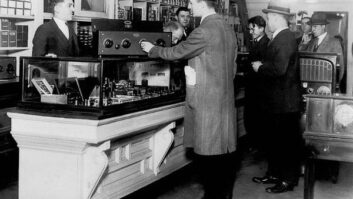Homeland Defense Internet Radio Station Serves Security Community Niche
WASHINGTON The media may be full of stories about homeland security; but for those who can’t get their fill of information about the threat level or how Congress is spending money to fight terrorism, there’s HomelandDefenseRadio.com.
The 24-hour Internet radio stream, based in Arlington, Va., bills itself as providing “time-sensitive information to the homeland defense community.”
HomelandDefenseRadio.com began broadcasts on March 15. The idea came from Don Dickson, publisher of Homeland Defense Journal, a print and online magazine. Dickson co-owns HomelandDefenseRadio.com with Bill Day, who serves as executive vice president of the radio Web site.
According to Day, HomelandDefenseRadio.com is a separately owned company that partners with Homeland Defense Journal for cross-promotion, content and advertising.
“We have the ability to offer integrated advertising campaigns that include radio, print, conference sponsorships and market research. I don’t think there is any other media outlet that can offer that to homeland security advertisers,” he said.
Niche radio
Dickson asked Internet broadcasting veteran Marlis Majerus to start the radio site. Majerus was a founding employee of FederalNewsRadio.com, which calls itself the first all-news online radio station and is owned by Bonneville station WTOP(AM) in Washington.
Majerus, who is vice president of news and programming for HomelandDefenseRadio.com, said the new venture is “very specialized, niche radio.” She said it speaks to first responders such as police and firefighters and also to “buyers, sellers and decision-makers” in the homeland defense community.
The regular features include reports geared for state chief information officers, advice on applying for grants to receive some of the millions of dollars allocated for homeland security and the latest on technology for the homeland defense community. Majerus said anyone with a computer and Internet access is welcome to go the site and listen, but she said the general public would find much of the content hard to relate to.
There are a few features for general consumption, such as Homeland Security Watch, with the latest information on homeland security issues, and Firehouse Gourmet, a weekly item that presents “rib-sticking recipes” from firefighters.
HomelandDefenseRadio.com produces one hour of new programming each day, which repeats. The new broadcasts begin at midnight.
The broadcasts are exclusive to the site, but Day said the company is “exploring opportunities and interest levels” of radio stations that may want to broadcast some of the material.
Majerus said content comes from the work of the news staff, as well as from press releases and information from other Internet sites. HomelandDefenseRadio.com subscribes to the Associated Press and occasionally airs live feeds from the AP Hotline. Some story ideas come from the station’s partner, Homeland Defense Journal, Majerus said.
According to Day, Wireless Communications Association International also is a content partner. He said the site was to begin a weekly “Business of Homeland Security Report” in September with HomelandDefenseStocks.com
HomelandDefenseRadio.com broadcasts from a studio in the office building that houses the company. Day said design and construction were done in consultation with the site’s freelance broadcast engineer, Lew Walker.
“He designed and built a studio that allows us to conduct in-studio and phone interviews as well as taking call-in questions from listeners,” Day said.
Costs, sponsors
The stream is automated using Simian, digital audio automation software from Broadcast Software International. Day said three Dell workstation computers are used for the site. One is dedicated to the automation software and another runs Windows Media encoder, which sends the content to the streaming provider. The third computer is for production using Adobe Audition software.
The studio has an Allen and Heath Mixwizard WZ 12:2DX and AKG C1000S microphones. The studio also has a Telos One + One hybrid unit for handling telephone interviews. Freelance reporters collect sound in the field using MiniDisc recorders, produce them using Cool Edit software and file their stories via e-mail.
Day wouldn’t comment on how much it cost to start the company or what the annual budget is. The founder of another automated Web stream estimated that, using the equipment HDR says it has, initial equipment costs were likely $15,000 and annual streaming costs could be pegged around $25,000-$30,000.
The Internet radio station has three major sponsors: Geico, Motorola and Citrix, a company that provides infrastructure to access business information on demand. The sponsors have signed on for the first year of the radio stream, according to Majerus.
The Internet station has a small staff. Majerus asked veteran Capitol Hill broadcaster Dan Scanlan to come out of retirement to become assistant news director. Scanlan, who left CBS in 2000, has also worked for AP, Mutual Broadcasting and NBC.
The site has added two more journalists: Pye Chamberlayne, a 35-year veteran with United Press International, and Dick Rosse, formerly with Mutual and NBC. Majerus said a number of stringers report for the news service.
There is one full-time sales person and one part-time sales rep for HomelandDefenseRadio.com. Sales people for the Homeland Defense Journal also sell for the radio site.
According to Day, the audience for HomelandDefenseRadio.com is growing. He said the site has about 31,000 listeners a month, with an average time spent listening of 56 minutes.
The company tracks IP addresses of listeners; most are from government, he said. The audience includes listeners from Australia, Canada and the United Kingdom. Listeners are invited to sign up for a weekly program guide on the Web site.
Majerus says she was hesitant about making the switch from FederalNewsRadio.com to the new homeland defense station, but saw the need for a site where people in the homeland defense community could receive and share the latest information.
“It’s a scary world. I am heartened by what I learn, what our country’s doing to keep us safe. And we get the word out that something’s being done to keep us safe.”












